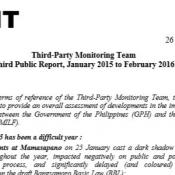Summary
In line with the terms of reference of the Third-Party Monitoring Team, this third public report is intended to provide an overall assessment of developments in the implementation of the Agreements between the Government of the Philippines (GPH) and the Moro Islamic Liberation Front (MILF).
It is clear that 2015 has been a difficult year :
– the tragic events at Mamasapano on 25 January cast a dark shadow over the peace process throughout the year, impacted negatively on public and political attitudes towards the process, and significantly delayed (and coloured) Congressional deliberations on the draft Bangsamoro Basic Law (BBL);
– in that climate, Congress was not able to complete its deliberations on the BBL, so the torch of peace will have to be taken up by a new Administration and Congress, from July;
– and even if more progress had been made in Congress, the substitute bills produced by the House and Senate committees considering the BBL were in a number of respects noncompliant with the Comprehensive Agreement on the Bangsamoro (CAB). This is an issue which will need to be taken up in the next Congress.
There has of course been significant progress in a number of areas related to the peace process during the year :
– discussions in Congress, even if not completed during this administration, allowed all stakeholders to have their say, ventilated all the issues, and can provide a solid foundation on which the next Congress can build;
– the first, ceremonial, stage of decommissioning of MILF weapons and forces on 16 June underlined the MILF’s determination to fully comply with its commitments under the CAB;
– there were also significant if less visible developments in other aspects of normalisation, in preparing support for former combatants and their communities, in strengthening the footprint of the Independent Decommissioning Body (IDB), in initial preparations for acting against private armed groups, and in the timely submission of the report of the Transitional Justice and Reconciliation Commission (TJRC), on 9 December;
– the ceasefire mechanisms continued to work smoothly throughout the rest of the year (notwithstanding the fact that these mechanisms had been ignored and put at risk in Mamasapano);
– efforts to build a greater inclusivity continued, both between the MILF and the different groups within the MNLF, and with many of the Sultanates;
– there was a significant upwelling of both domestic and international support for the peace process, for example through the work of the Citizens’ Peace Council and many other civil society efforts, or through the statement of resident Ambassadors in October.
In this difficult context, it was encouraging that both Parties remained fully engaged with the process, and fully committed to building the sustained peace foreseen in the CAB. This was confirmed at the most recent meeting of the Panels, in Kuala Lumpur on 10-11 February,
reaffirming the Parties’ commitment to stay the course of peace, and agreeing to sustain the existing peace infrastructure and to work for the early passage of a BBL in the next Congress. It was confirmed also in the MILF statement of 18 February, expressing disappointment at the non-passage of the BBL, but underlining that the MILF would continue to uphold the peace process and preserve its gains, and calling on the Bangsamoro people to remain patient and to rally behind the full implementation of the CAB.
There were also many technical difficulties and challenges arising throughout the year. For example, support for the 145 former combatants decommissioned in June was delayed, whcn this could otherwise have served as an encouragement to those who would follow in the next phase. The normalisation fund / trust fund foreseen in the CAB has not yet been established. No decisions have yet been taken on deploying the Joint Peace and Security Teams, which could have offered a potent example of AFP-PNP-MILF cooperation in supporting peace and order. No progress has yet been made on determining the parameters for amnesty.
While Mamasapano had a considerable negative impact on public confidence in the peace process across the nation, the failure of Congress to complete its deliberations on the BBL (and the tenor of some of these discussions) has also meant that confidence in the peace process among the wider Moro community has taken a knock. It is encouraging that there has been no violent reaction by the MILF to the non-passage of the BBL (comparable to that which followed the failure of the MoA-AD in 2008). However, it is possible that this setback in achieving the long-held aspirations of the Bangsamoro could increase the risk that some young people could become more attracted to violent extremism – against which risk the most effective vaccination is a successful conclusion to the peace process.
Looking forward, it will be essential to build a path forward, a “Plan B”, so that the next Administration can hit the ground running, to work to sustain public confidence in the process during this period of uncertainty, and to reaffirm the commitment of all stakeholders to winning the prize of peace.
That said, the TPMT remains confident that this prize of peace can be attained, no matter which administration takes office on 30 June. No administration can afford to ignore the costs of conflict in Mindanao – not the human costs of conflict, the costs of development delayed or foregone, the budgetary and security costs of conflict, nor the risk of worsening a climate conducive to the spread of violent extremism. Given this, the CAB will necessarily remain the cornerstone of peace. And the best guarantee of success lies in the continued commitment of both Parties (evident at the highest levels throughout this past year) to addressing the Bangsamoro question and building the peaceful future in Mindanao which future generations deserve.
